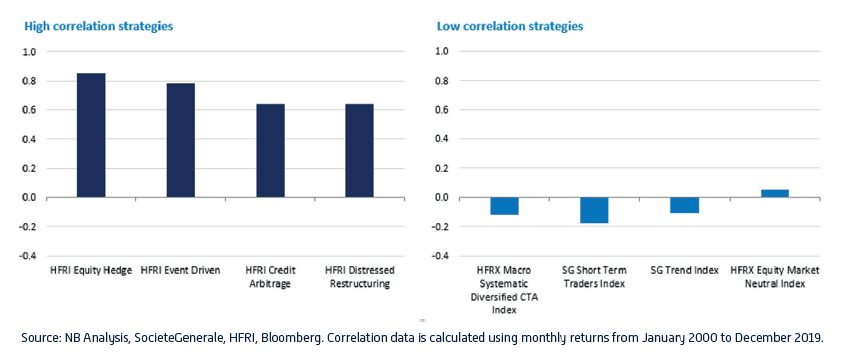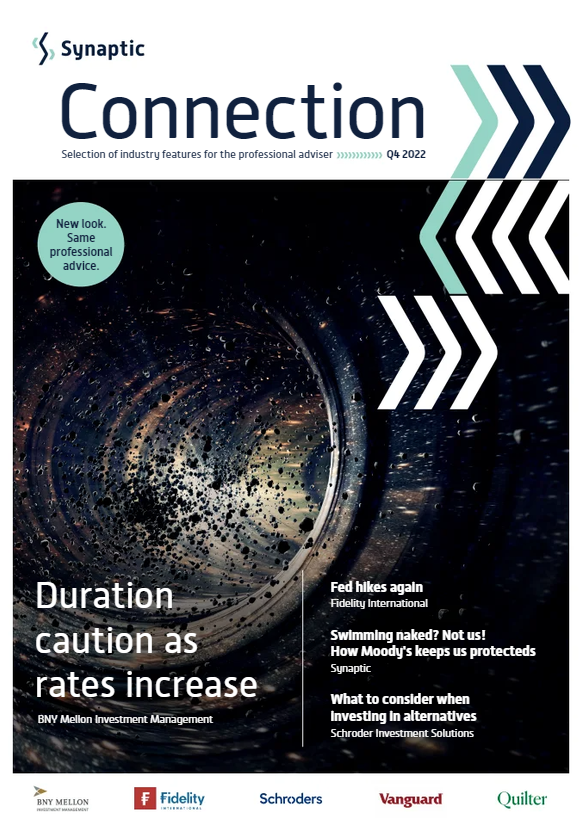In this edition...
- Ignore the Noise and Stick to the Strategy Eric Armstrong, Client Director, Synaptic
- Fed hikes again, but are we passed peak hawkishness? Salman Ahmed, Global Head of Macro and Strategic Asset Allocation, Fidelity International
- Duration caution as rates increase Paul Flood, Head of Mixed Assets Investment Newton Investment Management, part of BNY Mellon Investment Management
- Why investors shouldn’t overreact to talk of a recession Shaan Raithatha, Senior Economist - Vanguard, Europe
- What should I consider when investing in Alternatives in my multi-asset portfolio? Alex Funk, CIO Schroder, Investment Solutions
- Has the world changed? Mark Harris, Portfolio Manager, EPIC Investment Partners
- Swimming naked? Not us. Moody’s keeps us well protected. Eric Armstrong, Client Director, Synaptic
- The high-carbon transition Natasha Landell-Mills, Head of Stewardship, Sarasin & Partners
- Twitter, tech stocks & the untapped monetary potential Richard O’Sullivan, Investment Research Manager, RSMR
- GPUs are driving the future of computing Hamish Chamberlayne, Head of Global, Sustainable Equities
- Impact investing doesn’t mean compromising on returns M&G Investments,
- Quilter: Integrating responsible investment into your advice process Andy Miller, Investment Director Lead, Quilter
- Being green is in fashion Rahab Paracha, Sustainable multi-asset investment specialist, Rathbones
- Growth Investing: why the hunt for outliers remains compelling Stuart Dunbar, Partner, Baillie Gifford & Co
- Freedoms revisited - Where do we go from here? Matt Ward, Communications Director, AKG
 When considering which alternatives to add to a portfolio you should start by defining the objective that you want to achieve.
When considering which alternatives to add to a portfolio you should start by defining the objective that you want to achieve.
As much as the only constant in life is change, volatility in markets is always present. However, over the past two years investors have not only had to deal with rising volatility across equity and bond markets, they have also had to contend with an increase in the correlation between the two asset classes. This has reduced the level of diversification that can be achieved by combining equities and bonds alone within a portfolio. As a result, many investors have been searching for additional asset classes or sub sectors of asset classes that can add further diversification to their portfolios and help protect them from heightened volatility.
The reason for adding alternatives to your portfolio is not as a replacement asset class but to bolster diversification. However out-of-favour fixed income may be, it still has an important role in portfolio construction, particularly during periods of severe stress when Government Bonds and especially US Government Bonds, are seen as a safe haven.
Define your objectives
When considering which alternatives to add to a portfolio you should start by defining the objective that you want to achieve. Some ways you might define this could be:
• Less risk than global equities.
• Minimising loss to a certain percentage over a given time frame.
• Downside protection during periods of market stress.
• Returns which are not dependent on traditional market movements.
This is an important starting point as it will shape your investment selection and portfolio construction. For us at Schroder Investment Solutions, we want our
alternatives investments to achieve the following:
• Half the Beta of global equities.
• With a correlation of between -0.5 to 0.5 to global equities.
This allows us to be more defensive or add more Beta (risk) to our alternatives investments depending on what our view is on the market cycle.
The need for true alternatives
Next you need to consider which investments may come across as ‘alternatives’ but might not provide you with the correlation benefits you want to achieve. The most common investments we see here are thematic investments which include clean energy funds and climate change funds. These give you access to important long-term trends, but should not be included in your alternatives allocation as their underlying investments are in equities.
Investment trusts also need to be treated with caution. Although the underlying investments such as private equity, infrastructure or real assets, may have a low correlation to global equities, the investment vehicle is a listed instrument and so subject to volatility driven by buyers and sellers within the equity market (known as Equity Beta). Some investment trusts exhibit less Equity Beta than others due to the make up of their shareholders and underlying assets, but market stresses can still cause equity like volatility. Including investment trusts in your alternatives allocation may make sense from an allocation perspective, but it is crucial to blend this correctly with more defensive and lowly correlated alternatives.
Hedge funds and CTAs: alternatives to consider
Hedge funds are another common addition to multi-asset portfolios. Hedge funds have their own investment objectives and you need to understand how these relate to what you want to achieve.
The below charts highlight the correlation of various hedge fund strategies with global equities.
Different types of hedge fund provide different levels of protection in your portfolio relative to global equities during periods of market volatility. It is prudent to invest in a basket of lowly correlated hedge funds that provide the level of downside protection you require.
Funds that aim to achieve consistent returns regardless of the general market direction can also be useful in portfolio construction. These include trend following strategies or CTAs which look for consistent short-term trends in the market regardless of direction which they can exploit to generate a return.

Constructing your clients’ investment portfolios
Some alternatives have properties that are primarily defensive in nature. These can help to mitigate losses within a portfolio when global equities are falling in value but are likely to lag behind in rising markets.
When constructing client portfolios you need to understand the type of contribution that different alternatives can make towards meeting their objectives, and blend these accordingly to help achieve their client outcomes.
Get in touch
schroders.com/investment-solutions
0207 658 3894
Important Information:
Marketing material for professional clients only. Past performance is not a guide to future performance and may not be repeated. The value of investments and the income from them may go down as well as up and investors may not get back the amount originally invested. Exchange rate changes may cause the value of any overseas investments to rise or fall. The views and opinions contained herein are those of the author and may not necessarily represent views expressed or reflected in other Schroders communications, strategies or funds. This material is intended to be for information purposes only and is not intended as promotional material in any respect. This information is not an offer, solicitation or recommendation to buy or sell any financial instrument or to adopt any investment strategy. Nothing in this material should be construed as advice or a recommendation to buy or sell. Information herein is believed to be reliable but we do not warrant its completeness or accuracy. The material is not intended to provide, and should not be relied on for accounting, legal or tax advice. Reliance should not be placed on any views or information in the material when taking individual investment and/or strategic decisions. No responsibility can be accepted for error of fact or opinion. This document may contain “forwardlooking” information, such as forecasts or projections. Please note that any such information is not a guarantee of any future performance and there is no assurance that any forecast or projection will be realised. Any reference to sectors/countries/stocks/securities are for illustrative purposes only and not a recommendation to buy or sell any financial instrument/securities or adopt any investment strategy. Schroders will be a data controller in respect of your personal data. For information on how Schroders might process your personal data, please view our Privacy Policy available at www.schroders.com/en/privacypolicy or on request should you not have access to this webpage. For your security, communications may be recorded or monitored. Issued in September 2022 by Schroder Investment Management Limited, 1 London Wall Place, London EC2Y 5AU. Registration No. 1893220 England. Authorised and regulated by the Financial Conduct Authority. UK005051.
Sign up for updates
Keep up to speed with everything you need to know each quarter, by email or post.


